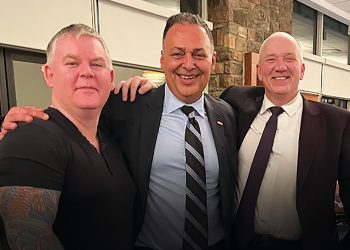Moderator: Chris Kelly, President & CEO, Ebby Halliday Companies, North Texas; Broker Relations Liaison, National Association of REALTORS®
Panelists:
Rick Haase, President, United Real Estate; COO, United Real Estate Group, Dallas
James D’Amico, President & CEO, CENTURY 21 North East, Danvers, Mass.
Candace Adams, President & CEO, Berkshire Hathaway HomeServices New England, New York & Westchester Properties
Bess Freedman, CEO, Brown Harris Stevens, New York
 Chris Kelly: Perhaps not surprisingly, merger-and-acquisition activity in our industry was up 45% year over year in 2021, according to a midyear report by real estate advisory firm Hodes Weill & Associates. That’s a thought-provoking circumstance in what has been one of the busiest and most productive years in recent memory. It got us wondering what, if anything, the COVID-19 pandemic had to do with it, and secondarily, what the advantages and challenges are to merging or acquiring companies in this or any year. Rick, your company has been busy in that regard. Let’s start with you.
Chris Kelly: Perhaps not surprisingly, merger-and-acquisition activity in our industry was up 45% year over year in 2021, according to a midyear report by real estate advisory firm Hodes Weill & Associates. That’s a thought-provoking circumstance in what has been one of the busiest and most productive years in recent memory. It got us wondering what, if anything, the COVID-19 pandemic had to do with it, and secondarily, what the advantages and challenges are to merging or acquiring companies in this or any year. Rick, your company has been busy in that regard. Let’s start with you.
 Rick Haase: Yes, we’ve grown exponentially over the last three years, primarily through acquisition, although I don’t think any of it was COVID-related. In most cases, our mergers originated from brokers looking at their own future and what’s best for their agents going forward. If anything, the pandemic may have slowed down the process rather than expedited it.
Rick Haase: Yes, we’ve grown exponentially over the last three years, primarily through acquisition, although I don’t think any of it was COVID-related. In most cases, our mergers originated from brokers looking at their own future and what’s best for their agents going forward. If anything, the pandemic may have slowed down the process rather than expedited it.
 James D’Amico: I’d have to agree. I think some brokers who may have been thinking of retiring decided to ride the wave created by the pandemic with the intent of selling when their companies were at their most profitable, at the peak of the market.
James D’Amico: I’d have to agree. I think some brokers who may have been thinking of retiring decided to ride the wave created by the pandemic with the intent of selling when their companies were at their most profitable, at the peak of the market.
 Candace Adams: There are some who’ve been deciding the time is now. I think the trend these days is toward larger companies with better systems and support—especially, as in our case most recently, when the merger means a sensible expansion of the brand’s geographic footprint and the selling broker stays in place. It should also mean it leaves you better able to enhance the offerings to your agents.
Candace Adams: There are some who’ve been deciding the time is now. I think the trend these days is toward larger companies with better systems and support—especially, as in our case most recently, when the merger means a sensible expansion of the brand’s geographic footprint and the selling broker stays in place. It should also mean it leaves you better able to enhance the offerings to your agents.
 Bess Freedman: In the case of our 2020 restructuring with Halstead, for example, we had the same ownership. The merger made total sense because it doubled our resources in a highly competitive market.
Bess Freedman: In the case of our 2020 restructuring with Halstead, for example, we had the same ownership. The merger made total sense because it doubled our resources in a highly competitive market.
CK: There had to have been challenges at the executive level…
BF: Of course. We lost a few good people, but we also hired a few—and since then, we’ve continued to grow and we’ve been able to open some big, new office spaces. Culturally, it was something of a challenge at first, but the result has been fantastic. We are altogether stronger as a company. Of course, we are privately held, which can be very different from big corporate mergers.
JD: There is almost always a cultural challenge to a merger, but a good orientation process really helps. In each case, we meet with every single onboarding agent, answer all their questions, be sure they have a good overview of the company and its benefits to them, and provide a thorough systems training. In the end, in every case, we wind up stronger together.
CK: There’s a certain sensitivity in approaching an acquisition candidate. How do you identify these targets, and how do you open up the conversation?
BF: There are many reasons a broker may be ready—maybe they want out of the hustle and hassle and want to pivot back to sales. Or maybe it’s a matter of succession. Sometimes our agents are familiar with those kinds of situations—and they make the introduction.
RH: Yes, often there’s a third-party introduction, so we already know they are open to it. Then it’s a matter of meaningful conversation.
JD: We do the research, generally, to identify a good match—and then we just flat out call them. I’d say it’s been 50/50 whether they call us because they see us as a good fit, or we call them.
CA: Most often for us, it isn’t a cold call. We’ve had a long-standing relationship, and the conversation is comfortable—a collaboration, really. It’s an outgrowth of all that we know about each other’s companies and personal goals. Sometimes, even after the merger, we continue to share ideas. The important thing is that we always treat each other with respect.
JD: Nobody jumps into a merger—or an acquisition. But if you do it right, it’s what keeps the engine running—and it’s typically beneficial for both parties.
RH: Is there disruption? Yes. It’s a matter of problem-solving. Sometimes a little disruption is just what you need to dig deep into your operation and come out better on the other end.
For more information, visit https://www.nar.realtor/.












